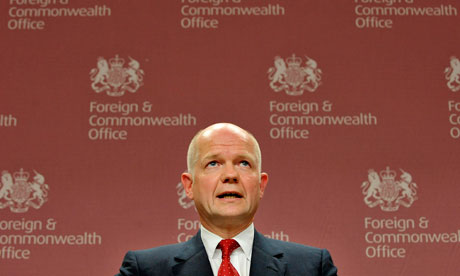Is William Hague spooked by rendition 'allegations'?
It's no coincidence Hague's effusive praise for secret services comes as an intelligence inquiry is to be held – in secret
Richard Norton-Taylor
guardian.co.uk, Thursday 17 November 2011 12.52 GMT
It was an unprecedented, and much under-reported, occasion. Never before had a British foreign secretary heaped so much praise, so publicly, on Britain's secret services.
Addressing an audience of the country's top securocrats, including the heads of MI6, MI5, and GCHQ, William Hague described their role as vital. British intelligence officers had saved lives, most recently in Libya, he said. Their dedication and professionalism had "few equals, and possibly no equals, among any of their counterparts".
So why did he feel the need to shower the country's spies and spooks with such approbation, so enthusiastically, even flamboyantly? There were plenty of clues in the speech he gave in the foreign office on Wednesday. "I know", he said, "that their values are the finest values of the United Kingdom." Yet, Hague added, their work threw up "some of the most difficult ethical and legal questions" he encountered as foreign secretary. He repeatedly stressed the need for "public confidence" in their work.
MI6 and MI5 have been shaken by the criticism, particularly in the Guardian – though not only here – of the involvement of British security and intelligence officers in the US practice of "extraordinary rendition", namely the secret and unlawful transporting of detainees to jails where they were abused and tortured.
Hague said in his speech that the "very making of these allegations undermined Britain's standing in the world as a country that upholds international law and abhors torture". The trouble is we are not talking about mere allegations. British involvement in activities leading to the abuse and torture of terror suspects and others, to Guantánamo Bay and elsewhere, is now well documented.
These facts came to light mainly as a result of persistent questions by some journalists and some MPs who refused to be thrown off the scent by officials and (mainly Labour) ministers. Ministers have since claimed they were not told by officials what was going on. Why else did the incoming coalition government last year feel obliged to publish "revised guidelines" for British intelligence officers, including those in the armed forces, interrogating detainees and suspects abroad?
Significantly, Hague repeatedly referred in his speech to ministerial accountability. He sees MI6 plans for secret operations every day, he said, "amounting to hundreds every year … I take ultimate responsibility for these operations, and I do not approve them all".
Yet when documents found in the files of Muammar Gaddafi's former intelligence chief, Moussa Koussa, showed that MI6 had been involved in the rendition of Libyans and their families to Gaddafi's jailers and torturers, ministers and former ministers (Labour and Conservative) ran for cover.
Usually impeccable Whitehall sources say that Britain was given assurances by Gaddafi's henchmen that those rendered – Sami al-Saadi and family and Abdel Hakim Belhaj – would not be tortured or ill-treated.
They also insist that MI6 got specific ministerial approval for the renditions. Jack Straw was foreign secretary at the time. Straw and everyone else – ministers, former ministers, and spooks alike – say they will not comment until they give evidence to the inquiry set up by the coalition government to look into the "allegations" of wrongdoing by MI6 and MI5.
The trouble is the inquiry, under Sir Peter Gibson, a former appeal court judge who was also an official "commissioner" responsible for monitoring the intelligence agencies, will hear all the information gathered by MI6 and MI5 in secret hearings. So how will the public know what the intelligence agencies were up to and whether ministers approved?
In an attempt to stop such revelations – or "allegations" as the government would have it – seeing the light of day again, the government has come up with proposals with the Orwellian title of "justice and security green paper". Under the proposals, no information gathered by the security or intelligence agencies would ever be disclosed in court. Instead, suitably vetted "special advocates" would see any "sensitive material" together with the judge sitting in private.
The green paper was triggered by high court and appeal court judges insisting that some CIA information passed to MI5 and MI6 about the treatment of the UK resident Binyam Mohamed who ended up at Guantánamo must be disclosed. The CIA was furious. In order to prevent evidence about what UK officials knew of the rendering of nine UK residents and citizens to the US detention centre on Cuba emerging in a later court case, the government – the taxpayer – awarded the former detainees millions of pounds in compensation in an out-of-court settlement.
Hague suggested that the green paper plan was designed "to achieve the proper administration of justice".
And it would ensure that evidence, as opposed to "allegations", of wrongdoing, would remain secret.


No comments:
Post a Comment